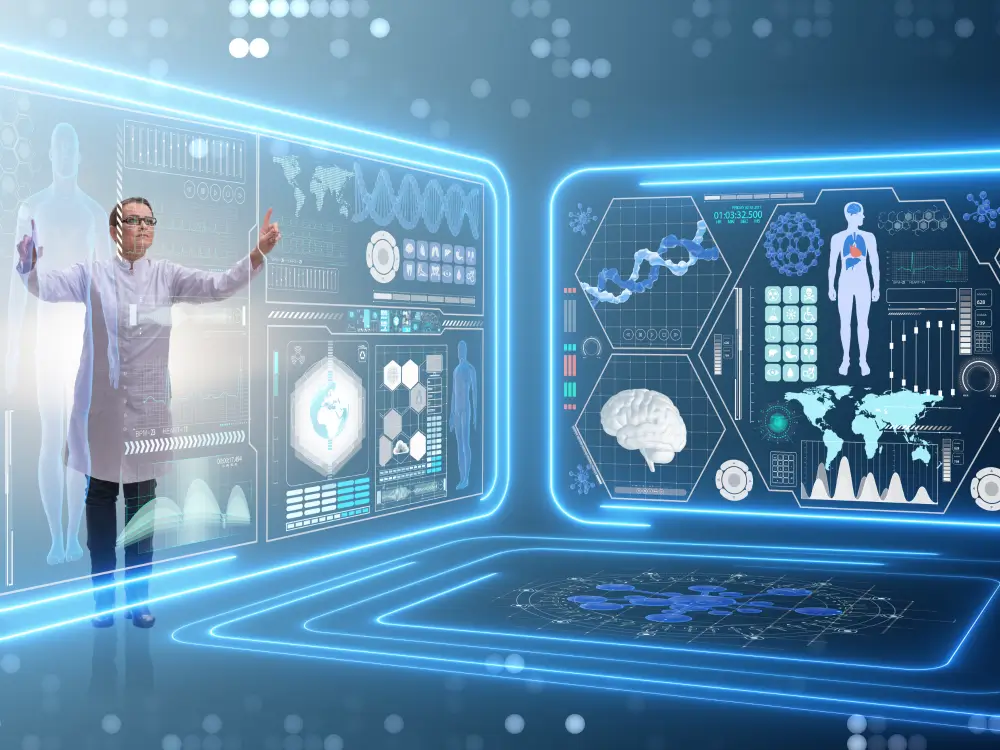
The healthcare industry has always been at the forefront of technological innovation, and in recent years, the integration of artificial intelligence (AI) has accelerated the pace of transformation.
AI is revolutionizing healthcare in myriad ways, from improving patient care and diagnosis to streamlining administrative tasks. In this article, we'll delve into the significant and growing role of AI in healthcare and explore the key benefits and challenges it presents.
1. Why AI in Healthcare?
- Enhanced Diagnostics: AI-powered algorithms can analyze medical images, such as X-rays and MRIs, with incredible accuracy. This not only speeds up the diagnostic process but also reduces the risk of human error.
- Personalized Treatment: AI can analyze patient data, including genetic information and medical history, to suggest personalized treatment plans. This tailored approach can lead to more effective interventions.
- Predictive Analytics: Healthcare providers are using AI to predict disease outbreaks and patient deterioration, allowing for proactive interventions and resource allocation.
- Administrative Efficiency: AI-driven chatbots and virtual assistants are handling administrative tasks, freeing up healthcare professionals to focus on patient care.
Applications of AI in Healthcare
AI's influence extends across various healthcare domains:
Radiology: AI algorithms can detect abnormalities in medical images more accurately than humans. For example, Google's DeepMind developed an AI system that can detect eye diseases by analyzing retinal scans.
Drug Discovery: AI accelerates drug discovery by analyzing vast datasets to identify potential drug candidates. This can significantly reduce the time and cost of bringing new medications to market.
Telemedicine: AI-powered telemedicine platforms offer remote diagnosis and treatment recommendations, especially crucial during the COVID-19 pandemic.
Genomics: AI aids in interpreting genetic data, helping identify disease risks and potential treatment options based on an individual's DNA.
Hospital Operations: AI optimizes hospital operations by predicting patient admission rates, staffing needs, and even equipment maintenance schedules.
Even the way designers prototype has had to shift. If you are designing a concept for an iPad, for example, it’s no longer sufficient to show a mockup of the concept on paper. Clients want to see the interaction in motion. They want to feel and touch it before it’s built.
Challenges and Considerations
While AI holds immense promise, several challenges must be addressed:
Data Privacy: Protecting patient data is paramount. Striking a balance between data access for AI and patient privacy is an ongoing concern.
Regulatory Hurdles: The healthcare industry is heavily regulated. AI applications need to meet stringent regulatory requirements to ensure patient safety.
Bias and Fairness: AI algorithms can inadvertently perpetuate biases present in historical healthcare data. Ensuring fairness in AI outcomes is a significant challenge.
Integration: Integrating AI systems with existing healthcare infrastructure can be complex and costly.
The Exciting Road Ahead
The rise of AI in healthcare represents a paradigm shift in how we approach patient care, diagnosis, and medical research. As AI technologies continue to advance, we can expect even more remarkable developments. Imagine AI-powered robot-assisted surgeries, early-stage disease detection, and treatments customized for an individual's genetic makeup becoming commonplace.
In conclusion, AI is not a replacement for healthcare professionals but a powerful tool to enhance their capabilities. The healthcare industry's embrace of AI is a testament to its potential to revolutionize patient care, increase efficiency, and drive medical breakthroughs. As we navigate the exciting road ahead, it's clear that the synergy between AI and healthcare will continue to save lives and improve the overall well-being of individuals worldwide.


